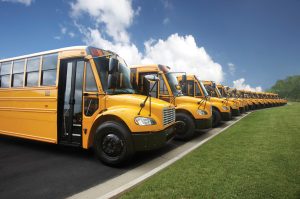A word from Thomas Built Buses’ President, Caley Edgerly on the benefits of Clean Diesel. Still have questions on what fuel type is right for your fleet after reading? Contact our Sales Department. We’d be happy to help you!
With so much talk about alternate fuels today, diesel has become a dirty word – literally. Districts running a diesel fleet are starting to feel the pressure to switch to something cleaner and greener, if only just to keep up with the buzz of the industry. But the truth is that diesel is just as clean – if not cleaner – at the tailpipe than any other alternative fuel out there. And districts running a diesel fleet continue to reap the benefits of proven durability, reliability and cost savings. Diesel today isn’t what it was 10 or 15 years ago and, in fact, it’s still the best long-term solution for most districts.
Greener and Cleaner
Because of compliance to tougher EPA emissions standards, diesel fuel is now cleaner than ever. Diesel emissions at the tailpipe are more than 90 percent cleaner than they were ten years ago and just as clean, if not cleaner, than other fuel types. When considering CO2, a greenhouse gas, diesel offers the lowest carbon footprint over the operational lifetime of the bus. That’s smaller than CNG and propane. In part, this is due to the new low-sulphur content in diesel fuel and also to the new state-of-the art engine technology, like that in the Detroit™ DD5™ that is revolutionizing not only emissions but also the maintenance required on new diesel engines.
Saving You Money
When it comes to a fleet’s total operating budget, the largest expenditure year after year is not the initial acquisition cost of a school bus, but the cost in fuel that a district spends to run its fleet. In fact, fuel costs represent more than two-thirds of the typical school bus fleet’s annual operating expenses.
Today, clean diesel engines, like the Cummins ISB 6.7L and the anticipated Detroit™ DD5™, are more fuel-efficient and provide greater fuel economy. Diesel remains the most fuel efficient engine in the market, providing up to 50% better fuel economy compared to other similar-size gasoline, propane or compressed natural gas engines. Of course the numbers vary based on usage, mileage, terrain and other factors but, with its overall low cost, efficiency, engine durability and resale value, diesel has a total cost of ownership lower than other alternative fuels.
And with diesel, you don’t have to deal with logistical issues and fueling upgrades that come with switching to another fuel. That’s even more money in the bank.
DIESEL Has Stood the Test of Time
The fact remains that 93 percent of today’s school buses run on diesel power. Diesel is proven. Fleets have been running on diesel fuel for 20 years or more, and even today the engines continue to be reliable, durable and have stood the test of time. Newer alternative fuel engines are upfitted and not built for the medium- and heavy-duty/commercial grade market. Diesel engines are built for a harsher market. In fact, diesel engines will last 15-20 years, while other engine platforms will need to be replaced multiple times during the normal lifecycle of a school bus.
New Engine Technology is Here
In 2018, the new Detroit™ DD5™ and DD8™ engines will debut. These engines will represent the best in fuel efficiency, durability, reliability, serviceability and technology/telematics in the industry. State-of-the-art engine technologies, like variable cam phasing, will help improve the performance and efficiency of the aftertreatment system and provide industry-leading emissions reductions.
The DD5 in particular will offer best-in-class fuel economy and reliability, with a B10 life of 400,000 miles. It will come with top-load oil and fuel filters for easier serviceability and the longest service intervals in its class, with up to 45,000-mile oil and fuel filter change intervals for short haul applications and 35,000-mile intervals for severe duty applications.
And this is only the beginning. We believe in diesel and will continue to invest in technologies and innovative solutions that continue to make diesel an even better solution for our customers now and into the future.

